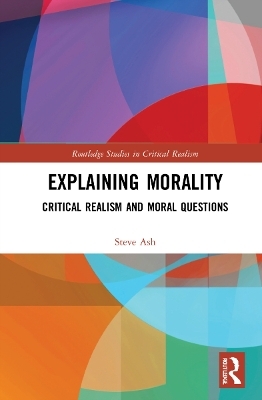
Explaining Morality
Critical Realism and Moral Questions
Seiten
2023
Routledge (Verlag)
978-0-367-53106-5 (ISBN)
Routledge (Verlag)
978-0-367-53106-5 (ISBN)
Enquiring into the nature of morality as an aspect of society and reality itself, this book employs a synthesis of critical realist thought in the development of a comprehensive theoretical understanding of morality that can be tested for its explanatory power by means of practical research.
Adopting a critical realist approach to morality, this book considers morality as an aspect of social reality, enquiring into the nature of moral agency and asking whether we can legitimately argue for a specific moral position and whether moral positions can be understood to apply universally. Drawing on the thought of Bhaskar, Collier and Sayer, it explores a series of ontological questions about morality, shedding light on the ways in which critical realism can be used to address them, ultimately responding to the question of whether critical realism and the moral theories that have been produced through its use can provide an explanation of morality as a feature of reality. Through a synthesis of realist thought, the author develops a comprehensive theoretical understanding of morality that can be tested for its explanatory power through subsequent practical research. As such, it will appeal to scholars of philosophy and social science with interests in critical realism, ontology and meta-ethics.
Adopting a critical realist approach to morality, this book considers morality as an aspect of social reality, enquiring into the nature of moral agency and asking whether we can legitimately argue for a specific moral position and whether moral positions can be understood to apply universally. Drawing on the thought of Bhaskar, Collier and Sayer, it explores a series of ontological questions about morality, shedding light on the ways in which critical realism can be used to address them, ultimately responding to the question of whether critical realism and the moral theories that have been produced through its use can provide an explanation of morality as a feature of reality. Through a synthesis of realist thought, the author develops a comprehensive theoretical understanding of morality that can be tested for its explanatory power through subsequent practical research. As such, it will appeal to scholars of philosophy and social science with interests in critical realism, ontology and meta-ethics.
Steve Ash gained his Ph.D. at the University of Southampton, UK, and is a board member of the Centre for Critical Realism.
Introduction 1. The Legitimacy of a Moral Argument 2. The Universality of Morality 3. The Question of Moral Agency 4. Morality as an Aspect of Society 5. Explaining Morality 6. Combining the Realist Moral Theories 7. Developing the Realist Model of Morality
| Erscheinungsdatum | 19.04.2022 |
|---|---|
| Reihe/Serie | Routledge Studies in Critical Realism |
| Zusatzinfo | 11 Line drawings, black and white; 11 Illustrations, black and white |
| Verlagsort | London |
| Sprache | englisch |
| Maße | 156 x 234 mm |
| Gewicht | 453 g |
| Themenwelt | Geisteswissenschaften ► Philosophie ► Ethik |
| Sozialwissenschaften ► Soziologie ► Allgemeines / Lexika | |
| Sozialwissenschaften ► Soziologie ► Empirische Sozialforschung | |
| ISBN-10 | 0-367-53106-2 / 0367531062 |
| ISBN-13 | 978-0-367-53106-5 / 9780367531065 |
| Zustand | Neuware |
| Haben Sie eine Frage zum Produkt? |
Mehr entdecken
aus dem Bereich
aus dem Bereich
unsere kollektive Verantwortung
Buch | Hardcover (2023)
wbg Theiss in Wissenschaftliche Buchgesellschaft (WBG) (Verlag)
35,00 €


